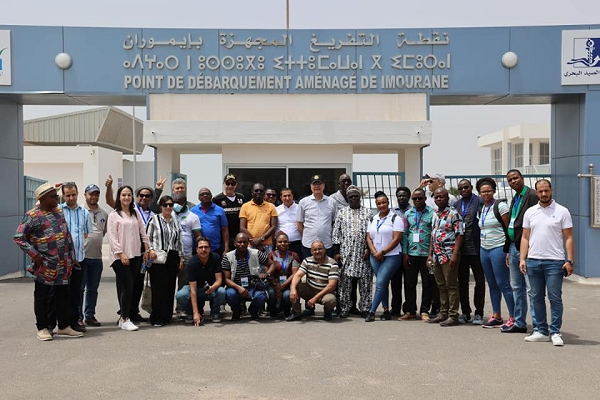
ATLAFCO urges African journalists to contribute to sustainable fisheries management
African journalists and media practitioners working in countries bordering the Atlantic Ocean have been urged to use their platforms to promote sustainable fisheries management practices and aquaculture development on the continent.
The Executive Secretary of the Ministerial Conference on Fisheries Cooperation among African States Bordering the Atlantic Ocean (ATLAFCO), Mr. Abdelouahed Benabbbou, who made the call at a seminar for journalists reporting on fisheries from the ATLAFCO member states in Agadir, Morocco, on Thursday, May 5, 2022, said African media had greater responsibility in contributing to the development of the fisheries and aquaculture sectors of the continent, particularly in the areas of education and advocacy for sustainable fisheries management practices.
Advertisement
Fisheries journalists
Mr. Benabbbou, who was speaking at the opening of a three-day seminar organised in Agadir for 22 selected journalists and media practitioners from the ATLAFCO countries, said when African media practitioners focused on the fisheries and aquaculture sectors, it would help fisheries stakeholders and players to be mindful of their activities regarding the sustainability and profitability of the sectors.
The seminar was on the theme: “Medias for sustainable development of fisheries and aquaculture.’’ It was organised by ATLAFCO in collaboration with Media Observatory for Sustainable Fishing in Africa (MOSFA), a network of fisheries journalists in Africa.
The seminar was meant to provide new insights into the fisheries sector and the communication tools needed to present the most pressing issues of fisheries and related coastal issues, climate change, erosion, land use planning and aquaculture issues such as pollution and fish diseases.
Themes
Topics discussed at the seminar included sustainable development of the fisheries sector in the ATLAFCO area: strengths and threats; current state and challenges of artisanal fisheries and aquaculture in Africa; the impact of video in the communication strategy to promote the Voluntary Guidelines for Sustainable Artisanal Fisheries in Africa; Fight against IUU fishing: international legal instruments and current status; and Sustainable management of fisheries resources and the fight against IUU fishing: what communication strategy for the countries of the ATLAFCO zone?
ATLAFCO
The Ministerial Conference on fisheries cooperation among African States bordering the Atlantic Ocean (ATLAFCO), is an intergovernmental organisation founded in 1989, gathering 22 countries in Africa, stretching from Morocco to Namibia.
The main objective of ATLAFCO is to ensure effective and active cooperation between Member States for the preservation of fishery resources and the sustainable development of fisheries in the African region.
Role of the media
Explaining further the important role of the media in sustainable fisheries management, the ATFLACO boss said the media played a critical role in the promotion of sustainable fisheries, particularly in the fight against Illegal, unreported and unregulated (IUU) fishing practices.
He said IUU fishing remains a major threat to the sustainability of fisheries resources in Africa, expressing the concern that the disinterest of African media practitioners in the fisheries sector was greatly affecting sustainable fisheries management practices on the continent.
For Mr. Benabbbou, if African journalists become more proactive in the fisheries sector, it would help to boost the sector’s prospects and sustainability.
He was of the view that the media could engender discussions around the fisheries sector, noting that when the media turned its focus on the fisheries sector, players and stakeholders would be compelled to comply with standard and sustainable fisheries management practices.
He said fisheries sector was key to all economies, particularly in the areas of food security and job creation, hence the need for the media to be interested in the sector.
MOSFA’s commitment
The Coordinator of MOSFA, Mr. André Naoussi, pledged the commitment of MOSFA journalists to continue to report on the fisheries sector to help ensure the sustainability of the sector.
He said the role of the media in sustainable fisheries management could not be underestimated, hence the rationale for the formation of the network in 2016.
He said the network was doing everything it could to ensure that the fisheries sector in Africa and across the world became more viable for all stakeholders.



